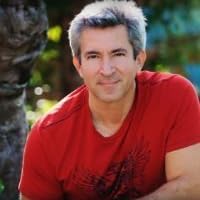Microbes Quotes
Quotes tagged as "microbes"
Showing 1-30 of 32

“...on opening the incubator I experienced one of those rare moments of intense emotion which reward the research worker for all his pains: at first glance I saw that the broth culture, which the night before had been very turbid was perfectly clear: all the bacteria had vanished... as for my agar spread it was devoid of all growth and what caused my emotion was that in a flash I understood: what causes my spots was in fact an invisible microbe, a filterable virus, but a virus parasitic on bacteria. Another thought came to me also, If this is true, the same thing will have probably occurred in the sick man. In his intestine, as in my test-tube, the dysentery bacilli will have dissolved away under the action of their parasite. He should now be cured.”
―
―

“Every day we live and every meal we eat we influence the great microbial organ inside us - for better or for worse.”
― Gut: The Inside Story of Our Body's Most Underrated Organ
― Gut: The Inside Story of Our Body's Most Underrated Organ
“It has been demonstrated that a species of penicillium produces in culture a very powerful antibacterial substance which affects different bacteria in different degrees. Generally speaking it may be said that the least sensitive bacteria are the Gram-negative bacilli, and the most susceptible are the pyogenic cocci ... In addition to its possible use in the treatment of bacterial infections penicillin is certainly useful... for its power of inhibiting unwanted microbes in bacterial cultures so that penicillin insensitive bacteria can readily be isolated.”
―
―

“If certain bacteria, fungi, or algae inch across something made of copper, they absorb copper atoms, which disrupt their metabolism (human cells are unaffected). The microbes choke and die after a few hours.”
― The Disappearing Spoon: And Other True Tales of Madness, Love, and the History of the World from the Periodic Table of the Elements
― The Disappearing Spoon: And Other True Tales of Madness, Love, and the History of the World from the Periodic Table of the Elements

“Our planet has entered the Anthropocene – a new geological epoch when humanity’s influence is causing global climate change, the loss of wild spaces, and a drastic decline in the richness of life. Microbes are not exempt. Whether on coral reefs or in human guts, we are disrupting the relationships between microbes and their hosts, often pulling apart species that have been together for millions of years.”
― I Contain Multitudes: The Microbes Within Us and a Grander View of Life
― I Contain Multitudes: The Microbes Within Us and a Grander View of Life

“Germans at the time believed, a little oddly, that dyes killed germs by turning the germs’ vital organs the wrong color.”
― The Disappearing Spoon: And Other True Tales of Madness, Love, and the History of the World from the Periodic Table of the Elements
― The Disappearing Spoon: And Other True Tales of Madness, Love, and the History of the World from the Periodic Table of the Elements

“When Orson Welles said "We're born alone, we live alone, we die alone", he was mistaken. Even when we are alone, we are never alone. We exist in symbiosis - a wonderful term that refers to different organisms living together. Some animals are colonised by microbes while they are still unfertilized eggs; others pick up their first partners at the moment of birth. We then proceed through our lives in their presence. When we eat, so do they. When we travel, they come along. When we die, they consume us. Every one of us is a zoo in our own right - a colony enclosed within a single body. A mutli-species collective. An entire world.”
― I Contain Multitudes: The Microbes Within Us and a Grander View of Life
― I Contain Multitudes: The Microbes Within Us and a Grander View of Life

“Even what’s inside you already, the colonies of microbes and bugs that eat your food for you, without them you’d die. Nothing of you is all-the-way yours. All of you is inherited.”
― Invisible Monsters
― Invisible Monsters

“Every person is a collective, a vast and complex gathering of interdependent life. Any description of ‘human’ must acknowledge these intimate strangers. Our bond with microbes is such that they are not so much riders, parasites, and assistants as part human. And we, it’s becoming increasingly clear, may need to begin thinking of ourselves as part microbe.”
― At Least Know This: Essential Science to Enhance Your Life
― At Least Know This: Essential Science to Enhance Your Life
“Over the years modern farming has reduced soil to....‘dirt’ – a sterile medium in which plants struggle to grow without artificial fertilizers. It is a self-perpetuating cycle of destruction and chemical dependence.”
― Wilding
― Wilding
“Microbiology teaches us that size is no measure of significance; even the smallest microbe can wield immense power. Microbes are the silent warriors; these tiniest beings possess the strength to spark a revolution that can have monumental impacts in the world of science.”
―
―
“The bacterium Escherichia coli (E. Coli) takes about twenty minutes to divide. So after one hour, one E. Coli cell has turned into eight. After only six and a half hours, there will be over a million bacteria!”
―
―

“I was struck by how different everything seemed with microbes in mind.”
― I Contain Multitudes: The Microbes Within Us and a Grander View of Life
― I Contain Multitudes: The Microbes Within Us and a Grander View of Life

“Every being devotes and dedicates itself to some innate purpose. Single cells, microbes, plants, insects, animals—every being makes its own unique contribution.”
― Future Sacred: The Connected Creativity of Nature
― Future Sacred: The Connected Creativity of Nature

“Every surface; every bit of air; every bit of water in your home is alive. The average house has thousands of species.”
― Never Home Alone: From Microbes to Millipedes, Camel Crickets, and Honeybees, the Natural History of Where We Live
― Never Home Alone: From Microbes to Millipedes, Camel Crickets, and Honeybees, the Natural History of Where We Live

“It’s the start of a new era, when people are finally ready to embrace the microbial world.
When I walked through San Diego Zoo with Rob Knight at the start of this book, I was struck by how different everything seemed with microbes in mind. Every visitor, keeper, and animal looked like a world on legs – a mobile ecosystem that interacted with others, largely oblivious to their inner multitudes.
When I drive through Chicago with Jack Gilbert, I experience the same dizzying shift in perspective. I see the city’s microbial underbelly – the rich seam of life that coats it, and moves through it on gusts of wind and currents of water and mobile bags of flesh. I see friends shaking hands, saying’ “how do you do”, and exchanging living organisms. I see people walking down the street, ejecting clouds of themselves in their wake. I see the decisions through which we have inadvertently shaped the microbial world around us: the choice to build with concrete versus brick, the opening of a window, and the daily schedule to which a janitor now mops the floor. And I see, in the driver’s seat, a guy who notices those rivers of microscopic life and is enthralled rather than repelled by them. He knows that microbes are mostly not to be feared or destroyed, but to be cherished, admired, and studied.”
― I Contain Multitudes: The Microbes Within Us and a Grander View of Life
When I walked through San Diego Zoo with Rob Knight at the start of this book, I was struck by how different everything seemed with microbes in mind. Every visitor, keeper, and animal looked like a world on legs – a mobile ecosystem that interacted with others, largely oblivious to their inner multitudes.
When I drive through Chicago with Jack Gilbert, I experience the same dizzying shift in perspective. I see the city’s microbial underbelly – the rich seam of life that coats it, and moves through it on gusts of wind and currents of water and mobile bags of flesh. I see friends shaking hands, saying’ “how do you do”, and exchanging living organisms. I see people walking down the street, ejecting clouds of themselves in their wake. I see the decisions through which we have inadvertently shaped the microbial world around us: the choice to build with concrete versus brick, the opening of a window, and the daily schedule to which a janitor now mops the floor. And I see, in the driver’s seat, a guy who notices those rivers of microscopic life and is enthralled rather than repelled by them. He knows that microbes are mostly not to be feared or destroyed, but to be cherished, admired, and studied.”
― I Contain Multitudes: The Microbes Within Us and a Grander View of Life

“Between the race of microbes and the race of humans there exists a total symbiosis and a radical incompatibility. One cannot say that the microbe is other to man: the two are never opposed in their essential natures, and they do not confront one another in any real sense; they are linked together, however, and this interlinking is, as it were, predestined: no one (neither men nor bacilli) can imagine things being any other way. Nor is there any clear line of demarcation, because this link is reproduced over and over ad infinitum. So perhaps after all we shall have to conclude that otherness is located here: that the absolute Other is indeed the microbe in its radical non-humanness - a being of which we know nothing, and which cannot even be deemed different from us. The microbe as the hidden form which alters everything - and with which no negotiation or reconciliation is possible. Yet we are quickened by the same life as the microbe, and the race of microbes will perish along with the human race: we share the same destiny. One is reminded of the worm that has a sort of alga living in its stomach, without whose help it can digest no food.
This is a fine arrangement until the day the worm takes a notion to devour the alga itself. And it does so - but dies as a result (without even digesting it, of course, because the alga is no longer there to help it to do so).”
― The Transparency of Evil: Essays in Extreme Phenomena
This is a fine arrangement until the day the worm takes a notion to devour the alga itself. And it does so - but dies as a result (without even digesting it, of course, because the alga is no longer there to help it to do so).”
― The Transparency of Evil: Essays in Extreme Phenomena
“There's no such thing as good and bad bacteria or fungi. It's not good and bad. It's just whether there's too much of it or too little of it and things are out of balance, so the 'bad things' have an opportunity to prosper.”
― The Regenerative Grower's Guide to Garden Amendments: Using Locally Sourced Materials to Make Mineral and Biological Extracts and Ferments
― The Regenerative Grower's Guide to Garden Amendments: Using Locally Sourced Materials to Make Mineral and Biological Extracts and Ferments

“Microbes can mutate every 20 minutes, while humans try to counterpunch with genetic evolutionary updates every 10,000 years or so. They are genetic dynamos, running circles around us.”
― The Psychobiotic Revolution: Mood, Food, and the New Science of the Gut-Brain Connection
― The Psychobiotic Revolution: Mood, Food, and the New Science of the Gut-Brain Connection

“Millions of years ago, bacteria and animals struck up a deal. In return for a moist bed and a warm buffet, beneficial bacteria took up the job of defending us against the madly proliferating pathogens in the world. It takes a germ to fight a germ.”
―
―

“When everything is running smoothly, you pay no attention to your gut. Like your heart or your liver, it’s best if these things are on autopilot. Your conscious mind is too busy looking for your keys to be trusted with running these critical organs.”
― The Psychobiotic Revolution: Mood, Food, and the New Science of the Gut-Brain Connection
― The Psychobiotic Revolution: Mood, Food, and the New Science of the Gut-Brain Connection

“The community of microbes living in your gut—your so-called microbiota—is like another organ of your body. It’s a seething alien living inside of you, fermenting your food and jealously protecting you against interlopers. It’s a pretty unusual organ by any measure, but even more so in that its composition changes with every meal.”
― The Psychobiotic Revolution: Mood, Food, and the New Science of the Gut-Brain Connection
― The Psychobiotic Revolution: Mood, Food, and the New Science of the Gut-Brain Connection

“It may be a shock to the ego, but you are not alone in your body, and your microbiota is right now making plans for your future. By manipulating your cravings and mood, it gains control over your behavior.”
― The Psychobiotic Revolution: Mood, Food, and the New Science of the Gut-Brain Connection
― The Psychobiotic Revolution: Mood, Food, and the New Science of the Gut-Brain Connection

“Only one percent of your genes are human, and those genes are fairly stable, but your microbial genes—the other 99 percent—are in constant flux. Measured by your genes, you’re a different creature each and every morning.”
― The Psychobiotic Revolution: Mood, Food, and the New Science of the Gut-Brain Connection
― The Psychobiotic Revolution: Mood, Food, and the New Science of the Gut-Brain Connection
“Our health and the planet’s health are intertwined, both deeply reliant on these invisible networks of life.”
― Invisible Friends: How Microbes Shape our Lives and the World around us
― Invisible Friends: How Microbes Shape our Lives and the World around us
“Microbes are the glue that holds it all together – our invisible friends.”
― Invisible Friends: How Microbes Shape our Lives and the World around us
― Invisible Friends: How Microbes Shape our Lives and the World around us
“If we could line the microbes from a single person’s gut up end to end, they would be able to circle the Earth two and a half times.”
― Invisible Friends: How Microbes Shape our Lives and the World around us
― Invisible Friends: How Microbes Shape our Lives and the World around us
“A healthy person is home to a hundred times more viruses than there are individual trees on the planet – a hundred global forests of phages inside you!”
― Invisible Friends: How Microbes Shape our Lives and the World around us
― Invisible Friends: How Microbes Shape our Lives and the World around us
All Quotes
|
My Quotes
|
Add A Quote
Browse By Tag
- Love Quotes 97.5k
- Life Quotes 76k
- Inspirational Quotes 73k
- Humor Quotes 43.5k
- Philosophy Quotes 29.5k
- Inspirational Quotes Quotes 27k
- God Quotes 26k
- Truth Quotes 23.5k
- Wisdom Quotes 23.5k
- Romance Quotes 23k
- Poetry Quotes 22k
- Death Quotes 20k
- Happiness Quotes 18.5k
- Life Lessons Quotes 18.5k
- Hope Quotes 18k
- Faith Quotes 18k
- Quotes Quotes 16.5k
- Inspiration Quotes 16.5k
- Spirituality Quotes 15k
- Religion Quotes 15k
- Motivational Quotes 15k
- Writing Quotes 15k
- Relationships Quotes 14.5k
- Life Quotes Quotes 14k
- Love Quotes Quotes 14k
- Success Quotes 13.5k
- Time Quotes 12.5k
- Motivation Quotes 12k
- Science Quotes 11.5k
- Motivational Quotes Quotes 11.5k


